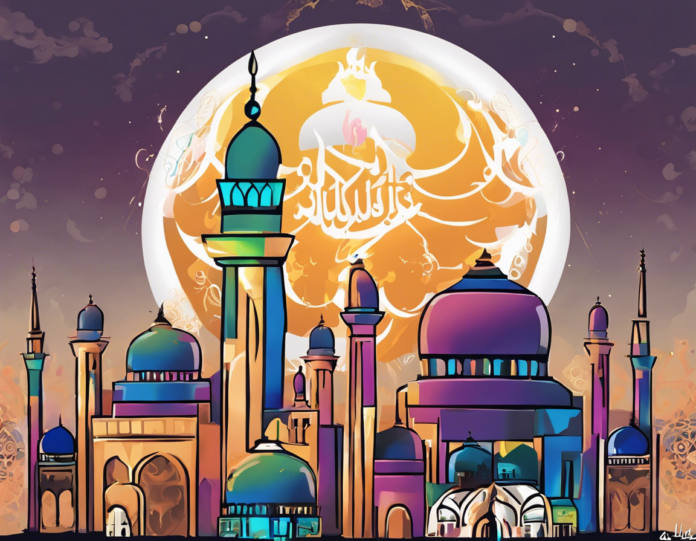Islam, the world’s second-largest religion, has an estimated 1.8 billion followers worldwide. A central tenet of Islam is the declaration of faith, also known as the Shahada, which states: “La ilaha illallah, Muhammadur rasulullah.” This proclamation is the creed of Islam, summarizing the belief in the oneness of God and the prophethood of Muhammad.
The Shahada: Declaration of Faith
The Shahada is the foundation of Islamic belief, declaring the essential creed that distinguishes a Muslim from a non-Muslim. It comprises two parts:
1. La ilaha illallah (There is no god but Allah)
This first part emphasizes the oneness of God in Islam, known as Tawhid. Muslims believe in the monotheistic concept of one God, who is transcendent, all-powerful, and the creator of the universe. This principle of Tawhid is central to Islamic theology and is the basis of all Islamic teachings.
2. Muhammadur rasulullah (Muhammad is the Messenger of Allah)
The second part of the Shahada affirms that Prophet Muhammad is the last and final messenger sent by God to guide humanity. Muslims believe that Muhammad received revelations from Allah in the form of the Quran, which serves as the holy scripture of Islam and provides guidance for all aspects of life.
The Importance of the Shahada
The Shahada holds significant importance in Islam for several reasons:
- Unity and Oneness: By declaring the oneness of God, Muslims affirm their belief in the indivisible nature of the divine.
- Prophetic Mission: Acknowledging Muhammad as the final messenger emphasizes the continuity of divine guidance through prophethood.
- Identity: The Shahada serves as a badge of faith, uniting Muslims worldwide in their shared belief in God and prophethood.
- Entry into Islam: Reciting the Shahada is the primary requirement for conversion to Islam, symbolizing a commitment to the Islamic faith.
Understanding the Creed in Practice
For Muslims, the creed encapsulated in the Shahada is not just a statement of belief but a guiding principle that shapes their worldview and actions. Belief in the oneness of God influences every aspect of a Muslim’s life, from worship practices to ethical conduct and interactions with others.
Theological Implications:
- Tawhid underscores the concept of divine unity and absolute monotheism in Islam.
- Belief in the prophethood of Muhammad signifies acceptance of his teachings and adherence to the ethical guidelines outlined in the Quran and Hadith.
Ritual Observances:
- The Shahada is recited in daily prayers (Salah) and is an integral part of various religious rituals in Islam.
- Muslim profession of faith includes the Shahada during key life events, such as birth, marriage, and death.
Moral and Social Values:
- The creed of Islam emphasizes righteousness, compassion, and social justice as core values derived from monotheistic belief.
- Muslims are encouraged to embody the principles of the Shahada through acts of charity, kindness, and service to others.
FAQs about the Creed of Islam
1. What does “La ilaha illallah” mean?
“La ilaha illallah” translates to “There is no god but Allah” and represents the concept of the oneness of God in Islam.
2. Why is the Shahada considered the cornerstone of Islamic belief?
The Shahada affirms monotheism and the prophethood of Muhammad, serving as the fundamental declaration of faith in Islam.
3. Can non-Muslims recite the Shahada?
While the Shahada is the declaration of faith for Muslims, non-Muslims are welcome to recite it as a symbol of respect or during conversations about Islam.
4. Is the Shahada recited in specific situations?
Muslims recite the Shahada in daily prayers, during the call to prayer (Adhan), and in moments of personal reflection or remembrance of God.
5. How does the Shahada impact a Muslim’s daily life?
The Shahada shapes a Muslim’s beliefs, actions, and interactions by emphasizing the oneness of God and following the example of Prophet Muhammad.
6. What is the significance of memorizing the Shahada?
Memorizing the Shahada allows Muslims to affirm their faith easily and serves as a reminder of their core beliefs wherever they may be.
7. Are there variations of the Shahada in different Islamic traditions?
While the core message of the Shahada remains consistent across Islamic traditions, variations may exist in different languages or cultural contexts.
8. Can the Shahada be recited silently?
Muslims may recite the Shahada silently during personal prayers or moments of reflection, as a way to reaffirm their faith in God and the prophethood of Muhammad.
9. How does the Shahada relate to the concept of Islamic monotheism?
The Shahada reinforces the concept of Tawhid, emphasizing the absolute oneness of God in Islamic theology and practice.
10. Is the Shahada a requirement for all Muslims?
The Shahada is the foundational declaration of faith in Islam and is considered essential for all Muslims, serving as a unifying creed for the global Muslim community.
In conclusion, the creed of Islam encapsulated in the Shahada is not just a profession of belief but a guiding principle that shapes the worldview, actions, and identity of Muslims worldwide. Understanding the significance of “La ilaha illallah, Muhammadur rasulullah” provides insight into the core tenets of Islamic faith and the principles that underpin the lives of millions of followers around the globe.

